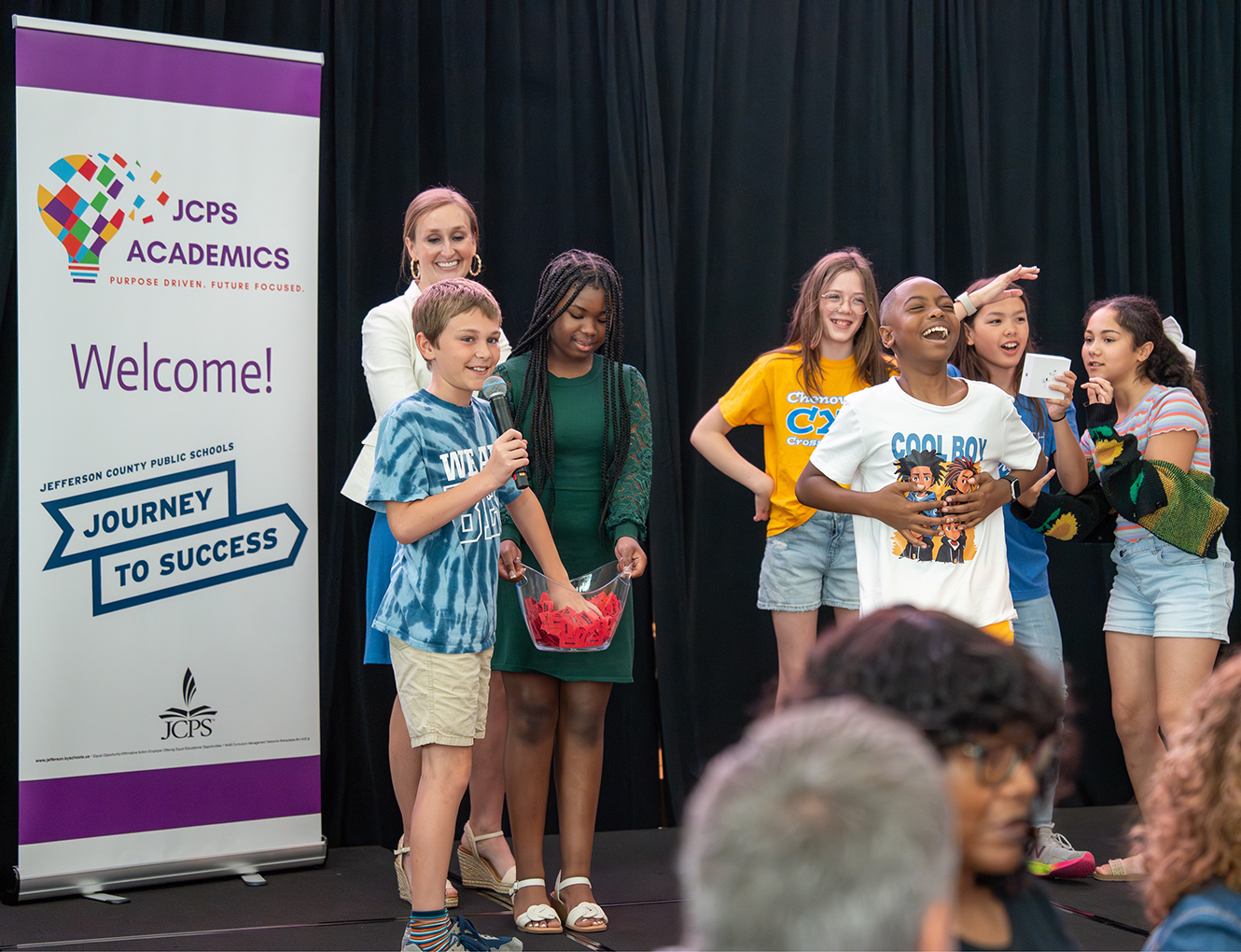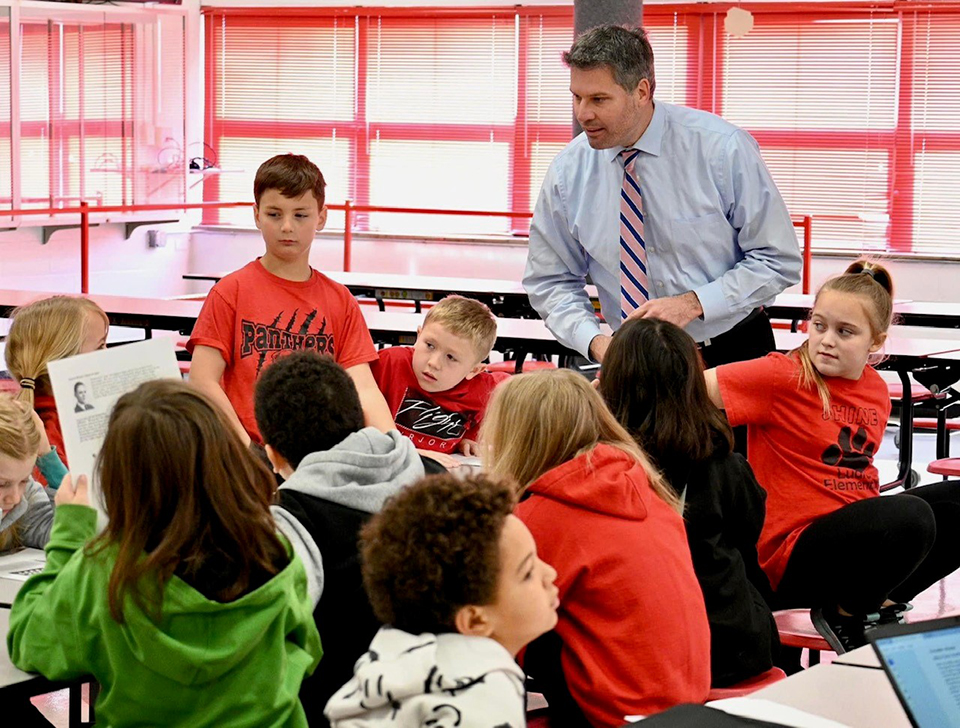
Debbie Murphy, 5th-grade social studies teacher, explains how she and fellow teacher Terena Moore use discussion cards while teaching “We the People” at Kingston Elementary (Madison County). Brenna Kelly, Sept. 30, 2015.
By Brenna R. Kelly
Brenna.kelly@education.ky.gov
One day each spring, 5th-grade students at Kingston Elementary come to school wearing dresses or jackets and ties. Their parents come, and so does the mayor and a newspaper photographer.
It’s the day the Madison County students show off their understanding of the U.S. Constitution at a mock congressional hearing.
“It’s fun for them to showcase what they have learned because they have worked on this for months,” said 5th-grade teacher Terena Moore.
In front of a panel of judges, each student speaks for four minutes about an aspect of government. Then the judges ask questions.
“They love it because they get to talk about issues that they have learned information about and they can debate,” Moore said. “They know what they are talking about.”
The event is the culmination of “We the People,” a government curriculum that Moore and fellow 5th-grade teacher Debbie Murphy, have been using in their social studies classes for the past seven years.
The pair first learned about the curriculum, developed by the Center for Civic Education, at a conference. They explained the benefits of the curriculum to other elementary teachers at the recent Kentucky Council for the Social Studies conference in Erlanger.
The curriculum includes five units, beginning with the founding of the United States and ending with how citizens can promote the common good. The lessons use real-life topics – such as snake handling in churches or requiring reflectors on Amish buggies – to spur discussions and get students thinking more deeply about the role of government, Murphy said.
“Sometimes you can tell students are just repeating what their parents say at home,” she said, “but the way this book presents topics allows students to form an opinion first without any preconceived notions, which I think is really good.”
Students use eight cards to preface their comments during their discussions. Before speaking, students hold up one of the cards with a saying such as “I challenge that” or “I can add to that.” They also use the phrases when responding to the judges at the congressional hearing.
Though the congressional hearing is the highlight, “We the People” is much more, Moore and Murphy said.
“I know testing isn’t the end-all, be-all,” Murphy said, “but when we started using this, our test scores went up quite a bit.”
The curriculum can be used for both high-achieving and struggling students because teachers can pick and choose how detailed they want to get when teaching the lessons, Murphy said. Moore, who also teaches special education students, said she often uses the textbook’s illustrations.
“All the way through the book the illustrations are great to teach from,” Moore said, “and it gives the students a chance to see what you are talking about.”
When Moore and Murphy began using “We the People,” they realized it was going to take about three months to get through all of the content. That meant they had to scale back some of their favorite lessons, such as Native Americans and explorers.
“We really, really looked at the standards and our principal sat down with us,” Murphy said. “Every government standard is hit by ‘We the People’, every one of them.”
Glenn Manns, a Kentucky Department of Education social studies instructional specialist, said the curriculum addresses current standards but also fits the draft social studies standards that are under review.
“It’s grounded in very rigorous content because not only do the students learn about where the ideas for our Constitution come from,” he said, “but also the skills that they learn in terms of researching, working together and most importantly, presenting that content in a hearing setting setting, really demonstrates a high level of engagement and understanding. That’s a real point of emphasis with our new standards, student’s applying knowledge and taking informed civic action.”
Manns, who also helps coordinate the We the People”program in Kentucky, said teachers seem to like the curriculum because it’s written by educators for educators.
“The thing I stress to teachers is there are a lot of good things out there and your classroom could almost emulate a kitchen,” he said. “There are a lot of good ingredients that you want to have on hand.”
Kingston is one of the few elementary schools in the state to use the curriculum and likely the only one holding the mock hearing, he said. The middle school and high school versions are more widely taught in Kentucky. A team from Highlands High School (Fort Thomas Independent) competed earlier this year in the National We the People Finals, a competition-style congressional hearing.

Terena Moore (left) and Debbie Murphy (right) spoke to fellow teachers about the “We the People” curriculum at the 2015 Kentucky Council of the Social Studies conference in Erlanger. Brenna Kelly, Sept. 30, 2015
Moore and Murphy didn’t hold the congressional hearing the first year they taught the curriculum, but now it’s become an event that includes a catered lunch for the judges.
“We’ve been doing it five years and we’ve had to work up to the production that it is now,” Moore said. “It didn’t start out that way at all.”
Instead of inviting guests to be judges, an easy way to start would be to have other teachers serve as judges, the teachers said. The students’ focus on one of the units for their presentation and their scores from the hearing become part of their grades, they said.
All 5th-grade students participate in the hearing, including the special education students. Last year, a nonverbal student with autism wrote his speech on his iPad and had the iPad read it out loud.
“It’s the process of getting to the hearing that is so good for the kids,” Murphy said. “The hearing itself is not the point, it’s the practice and the writing, the critical thinking and the public speaking. By the time the hearing comes, they really own their unit. They know it.”
Abigail Ealey, who teaches social studies at Benton Elementary (Marshall County), said she plans to start using “We the People” because her students seem to get bored with her current government lessons after about two weeks.
“I definitely want to use the hearing, because it makes it real life and practical for them,” she said. “That’s something they are going to be able to apply and use in the future.”
Moore and Murphy admit that spending three months on government and organizing the hearing takes a lot of hard work, but it’s worth it.
Kingston’s 5th-grade students scored 17.2 points above the state average on the latest K-PREP assessments, nearly 5 points above the district average. But it’s not just about the test scores, they said.
“Our 5th-graders know more about government than most adults walking around in the community,” Moore said. “They can debate with the superintendent about why a dress code is taking away rights. “They are able to speak their thoughts and be able to take action against something they don’t agree with.”
MORE INFO….
Debbie Murphy Debbie.Murphy@madison.kyschools.us
Terena Moore Terena.Moore@madison.kyschools.us
Glenn Manns Glenn.Manns@education.ky.gov



Leave A Comment